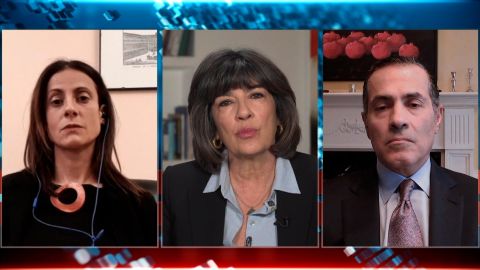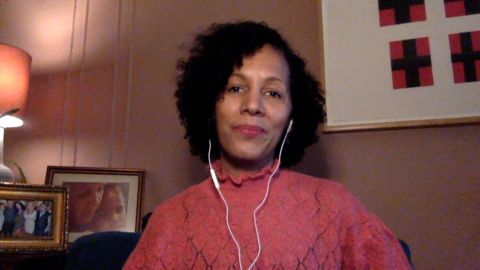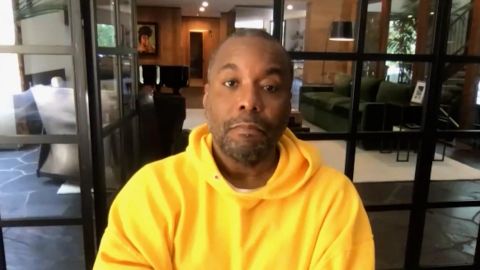Read Transcript EXPAND
CHRISTIANE AMANPOUR: Now, we continue the American story with the award-winning director, Lee Daniels, who is known for films like “The Butler” and the Oscar winning “Precious.” His latest offering “The United States Vs. Billie Holiday” depicts how the jazz legend ended up on the wrong side of the Federal Bureau of Narcotics. t was all down to her song “Strange Fruit,” a potent protest against lynching. The bureau exploited Holiday’s own drug addiction to try and silence her. Here’s Daniels speaking to our Michel Martin about that incredible story and his own struggles with addiction.
MICHEL MARTIN: Thanks, Christiane. Lee Daniels, welcome. Thank you so much for joining us.
LEE DANIELS, DIRECTOR, “THE UNITED STATES VS. BILLIE HOLIDAY”: Thank you, Michel. Thank you for having me.
MARTIN: So, you know, on a new show when we’re trying to figure out who we want to talk about on a news event we would say why this person on this topic at this time. So, I wanted to ask you this about this film. Why did you want to tell this story at this time?
DANIELS: I do films that are in my spirit. You know? Whatever is in the air. And racism is interesting because unless — you know, unless — they don’t have to call you a — to — you can smell it in the air. Systemic racism is real. It’s an aerosol. And you can’t — sometimes you can’t touch it. And I felt that there was something going on. There was this darkness that was in the air and that when the unmentionable got elected. And I knew that something was going on. I felt it. So, I was drawn to this material that Suzan-Lori Parks wrote based on this book that Jon Henry (ph) wrote and it was first time that I understood what “Strange Fruit” meant. I was attracted to this script because it was a call to arms and it was something that I thought in my spirit I had to do because it was in the air.
MARTIN: You know, it was interesting because I think a lot of people know that Billie Holiday was one of the great singers of all time or the great — certainly the jazz singers. I think people may know she struggled with addiction. But I don’t know that a lot of people know of the government’s role in pursuing her and in making her such a focus of this intense, just obsession in a way with — it leads to it some sort of bureaucrats. Would you give us a little synopsis of the story that you’re telling in this film?
DANIELS: It picks up with Billie first wanting to sing the song “A Strange Fruit” and the government not allowing her to sing that song. And her manager and her then husband trying to convince her to not sing it. And so, we see this defiant woman wanting to sing a song that, we’re (INAUDIBLE), what is the song? “Strange Fruit.” What is the song? So — and then we find out that the government is — they don’t want her to sing this song. This song is — it kicks off the civil rights movement as we know it. It’s a call to arms.
MARTIN: So, for people who are not aware, who have perhaps never heard it what is “Strange Fruit” about?
DANIELS: “Strange Fruit” is about the lynching of black people. It is a song about the lynching of us.
(BEGIN VIDEO CLIP)
BILLIE HOLIDAY: Southern breeze bear a strange fruit. Blood on the leaves and blood at the root. Black bodies swingin’ in the Southern breeze. Strange fruit hangin’ from the poplar trees.
(END VIDEO CLIP)
MARTIN: Billie was an international global superstar. I think the equivalent to Beyonce, you know, around the world. And they didn’t want her to sing the song. She refused to stop singing the song. So, they couldn’t hire white agents to infiltrate Harlem. So, they hired black agents to infiltrate Harlem to take her down, to stop singing the song. And she went to jail. And it’s really the — what her life — what happens to her life post singing this song to the end and how the government dogged her until her death bed and how they — we even question whether they were responsible for her death. Planting drugs on her. Anything they could to stop her from singing the song. Paying off her boyfriends. The song could not be sung. Hoover did not want that song sung.
(BEGIN VIDEO CLIP)
UNIDENTIFIED MALE: I cut “Strange Fruit.”
HOLIDAY: No, Joe, I want to sing the damn song. All right? The club advertises it. People pay good money to come here and hear me sing it.
UNIDENTIFIED MALE: I’ve told you a hundred times people in high places don’t want you singing that song.
HOLIDAY: And I’ve asked you over a hundred times, what people, Joe? What you looking at him for? I’m the one who pays you.
UNIDENTIFIED MALE: The government.
HOLIDAY: The government. People like your buddy (INAUDIBLE), right?
UNIDENTIFIED MALE: Quit it with that, huh.
HOLIDAY: The song means a lot to me, Joe.
UNIDENTIFIED MALE: (INAUDIBLE) commy.
HOLIDAY: Right. Come. I don’t care. All right? It’s important to me.
UNIDENTIFIED MALE: You ain’t singing that song.
HOLIDAY: I’ll sing whatever — I want.
(END VIDEO CLIP)
MARTIN: I think, you know, it was blacklisted from the radio. It just — what is it you think was so frightening?
DANIELS: Well, I think we know how frightening it was and then I even heard it throughout the years, I didn’t really understand the significance of it until I read the script. Black bodies swinging in the Southern breeze. Strange fruit hanging from the poplar trees. It is the ugliest thing I have heard. You know, the ugliest poem that I’ve ever read and it’s pungent and powerful and disturbing. It ain’t pretty. And yet she made it. I don’t know why she made it. But she made it so that we couldn’t take our eyes off her, Billie. And I was really happy that Andrew was able through God really work miracles and re-enacting that.
MARTIN: Is it true you didn’t really want her for the role at first? I think I read that, that you didn’t want her. Is that true?
DANIELS: Yes.
MARTIN: And why not?
DANIELS: It’s a hard role. She is in every scene. Every scene practically. And she carries the film. And so, I really wanted to work with an actor, someone who I had worked before and I couldn’t take that chance. And I loved her voice. I knew that she could understand what it was like, you know, as a vocalist. And I had gotten — so I was down to the wire with a couple incredibly known actors that would have been able to pull it off, but they were acting. Difference. You know, there is a difference. She transcended. It was a spiritual awakening for me watching her, her audition. And so, I met with her. I begrudgingly met with her. And she — I think, the first thing that I realized, oh, my God, this woman is maybe right for this role, is because she was nervous herself. She had such respect for Billie Holiday that she didn’t know that she could do her justice. And I had never seen anybody talk themselves out of an audition. I’ve been around many. I said, this is a good stunt. This girl is really — she’s a really good actress. But she really was talking herself out of it. You know, I don’t know whether I can do this. And I said, well, let me put you with an acting coach. Let me put you with a vocal coach. And I used my acting coach and vocal coach and I put them together. And the acting coach sent me a video of her getting into character. And her posture is changing. There was a change in her eye. Her vocal had changed. I don’t know what happened. And it was God speaking to me. I knew it was God speaking to me. And so — and then I think the day after that, I saw her at the academy awards where she shut it down singing and I knew this was the girl to play this character.
MARTIN: I feel like your film is also generous toward Jimmy Fletcher who, as you described, was the — a real person, a federal agent who was, you know, the head of this team that went to infiltrate, you know, the Harlem scene as it were to be sort of — he was supposed to be the agent of her downfall. We have a clip with Jimmy and Anslinger who is the government official who is sort of determined to take Billie Holiday down.
(BEGIN VIDEO CLIP)
UNIDENTIFIED MALE: Pardon me for asking. But why is that song so important to us?
UNIDENTIFIED MALE: Hoover says it’s unAmerican. You’ve heard those lyrics. They provoke people in the wrong way.
UNIDENTIFIED MALE: The wrong way. What would you have me do, sir?
UNIDENTIFIED MALE: You’re a good liar. Now, I need you to go down to the prison and tell her you’re sorry. She’ll believe you. She’s a sucker for men.
(END VIDEO CLIP)
DANIELS: A lot of black people are put in that position. My dad was. My dad was a cop at the height of the movement in Philadelphia. And I remember him coming home crying and it was — and I — you know, I was terrified of my father. He was abusive. But I remember feeling so sad for him. I had never seen him cry before. Ever seen him cry before. So, I think that there are lots of Jimmy Fletchers out there, lots of us that are doing it out there. And I think there, again, is a greatness to Jimmy, and that was the hardest role because it was walking the tight rope. It was the hardest role to direct. Because he — I mean, he took her down. And so — and then so why is he showing up and why are we even liking this guy? And — but we see that he was wrong. We see that he knows that he is being used.
MARTIN: I wonder, in addition to being a character himself and being — having been a real person who played a real role in the story, is there a bigger metaphor here about the dilemma that some black people are confronting?
DANIELS: Oh, come on now. You know, Michel, what the bigger metaphor. I mean, come on. We are living it daily. We see it daily. You know, some of these cops that were — that are out here doing what they’re doing, it’s horrible. You know, I was doing — I’m thinking about doing a procedural. And what is a cop show right now? What is a cop show right now? The idea, are they the good guys or the bad guys? And the stories that I’m hearing from black cops right now, I don’t want to tell those stories. I do not want to tell those stories.
MARTIN: Why not?
DANIELS: It’s too sad. Too sad. You have some unhappy black men out here that are serving our country, serving our country in, you know, as cops.
MARTIN: One of the things that always strikes me about your films is the contrast between the beautiful and the terrible. I mean, on the one hand a lot of your women characters are very strong and have their own sense of being and yet they are not immune from being brutalized. And yet — I don’t know, that duality seems to interest you. I want to hear more about that. The duality of it. Both the beautiful and the terrible.
DANIELS: Because we are. We really are. We’re not one, I don’t think. I think that, you know, for as tough as I am, I’m really, really weak. You know? I don’t — I’m tough and I’m weak. And I’m good and I’m bad. And I wake up every morning and I try to become — I do something. I want to be a good example for my kids. But I follow my (INAUDIBLE). And so, I look at the imperfections in everyone and to try to find the perfection in the imperfection in all of us. And I think in particular in my story, in black cinema, I just think that we are — often times it’s not — we’re the hero and that’s that, or we’re the bad guy and that’s that. But we don’t live in that gray area. And I like to live in that. I like to settle in that gray area. And that gray area is very disturbing to many people.
MARTIN: You get things out of people, people saying, I’m not sure other directors could get. And why do they trust you so much to go to such to go to such — to go to these difficult places? Because you’re asking them to take on and to channel a lot of pain. Why do you think they trust you to do that with them?
DANIELS: I think because I am so raw and honest, Michel, in my day-to-day with them that I talk about my insecurities. I talk about my inability as a director to find the scene that I’m scared, help me find the scene. And they see my fragility and my vulnerability, and that makes them vulnerable, too. They know everything about me. There are no secrets. I have no secrets when I’m working with an actor. My life is an open book. And when they are relaxed and open to receive, I yell, action and they’re in it and they don’t even know what happened. I don’t even know what happened. But we have found it. Because we are pure. We’re honest with each other in the moment. So, everything you see is real. Very real.
MARTIN: Well, speaking of being very open, you have been very open about your own struggles around addiction in the past. I know you talked to me about it in the past and I understand that subsequently you’ve even given up drinking. You’re sober, completely sober now. And I wondered, did those experiences find their way into the character, your experience with addiction? Because you’ve been highly productive the entire time. You were going through all of this as she was. And I just wondered, did that experience find its way into the story?
DANIELS: Yes. I mean, how can you be successful — I don’t know how I did it. You know, I’m trying to heal myself. I was trying the only way I knew how and I think the only way Billie knew how, and that was to anesthetize yourself from the pain of your childhood, of the darkness that you’ve encountered. You’re just trying to heal. You’re trying to live. And so, when you yank that away, that blanket away, that cover, it makes you feel good, it’s terrifying. So, it’s a dangerous thing for me to do this film. Sober. I don’t know whether it is good to be honest with you. I hope it’s good. I don’t know whether it’s good. I can’t — I’ll never going to back and look at it. But I’m not as confident about it as I am now.
MARTIN: Really? Why?
DANIELS: Because I’m not boozed. If you’re boozed, everything is good. You know what I mean? I’m not as confident as I am when I am using.
MARTIN: What allows you to finally release that? What allows you to finally let that go, the booze and the drugs? Because it sounds like you really kind of stepped out on the plank and jumped. What made you — what allowed you to do that?
DANIELS: What allowed me to do that was I just think it was time. It was just time. It was time. I’m 60. I’ve been drinking for all of my life. And four years ago, I decided as we began on this journey with Billie to stop, completely. To live in the truth, because I knew that I had to tell this story. I know that I had. For me to honor her, I had to tell it sober. That may not make sense to you. It may not make sense to you but it makes sense to me. I could not honor this addict high (ph).
MARTIN: Lee Daniels, thank you so much for spending this time with us.
DANIELS: Michel, thank you so much for having me. I look forward to coming back again and again.
About This Episode EXPAND
Should President Biden reverse the Trump administration’s withdrawal from the Iran Nuclear Deal? Experts Nathalie Tocci and Vali Nasr weigh in. Director Stacey Holman discusses her new PBS series “The Black Church.” Director Lee Daniels joins Michel Martin to discuss his new film “The United States vs. Billie Holiday.”
LEARN MORE


